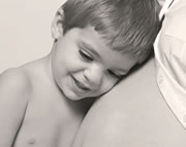Pregnancy the 2nd Time Around

It’s likely to be one of the first questions that runs through your head when you find out that you’re expecting another baby: how will this pregnancy be different from my first? While you’d need a crystal ball in order to predict exactly how your mind and body will react to this second stroll down Maternity Avenue – every pregnancy is different, after all! – it’s possible to make a few educated guesses about how things will play out between now and delivery day. Here’s what to expect:
- You may find that you’re less preoccupied with your pregnancy this time around. It is, after all, a lot more difficult to find the time to luxuriate in the fact that you’re pregnant again when you’re busy chasing a toddler or preschooler around the house. If you find yourself feeling guilty for letting the busyness of everyday life distract you from your excitement about being pregnant, try to cut yourself some slack: you’ll have plenty of time to bond with your new baby after the birth.
- You may find yourself worrying that you won’t love the new baby as much as you love your older child – or that you’re ruining your older child’s life by bringing a sibling into the picture. While there may be a few rough patches during the early weeks and months of your new baby’s life, you’ll no doubt find that you’re able to scratch these two items off your worry list relatively quickly. You’ll adjust to the new baby’s arrival and so will baby number one!
- You’re likely to feel extra tired this time around. Remember the good old days when you were able to succumb to the fatigue of early pregnancy by heading to bed at 7:00 p.m. or flopping out on the couch on Saturday and Sunday afternoons in order to catch up on your sleep? Well, that’s all ancient history if you’ve got a toddler or preschooler to look after. Even if your partner goes to heroic lengths to ensure that you get your rest, your mommy radar may make it difficult for you to relax and unwind if your toddler is playing in the next room. Add to that the fact that you are likely to find yourself on night-time parenting duty from time-to-time and you can see why sleep may be nothing more than the stuff of which dreams are made at this point in your life.
- You may start showing sooner. Because your uterus has already been down this road before and your abdominal muscles might not be quite as taut as they were the first time around, you can expect to start showing sooner than you did during your first pregnancy. Some second-time moms find, in fact, that they’re into their maternity clothes long before they reach their second trimester.
- You may detect fetal movement sooner than you did the first time around. Because you’re already an old pro when it comes to detecting fetal movement, you can expect to start feeling your baby’s flutters a few weeks earlier this time. First time moms often have difficulty distinguishing between bonafide fetal movement and run-of-the-mill gastrointestinal sensations. Of course, as with anything else pregnancy-related, your mileage may vary on this front: if your baby decides to camp out towards the back rather than the front of your uterus during this pregnancy, you may have difficulty detecting much fetal movement until you’re well into the second half of your pregnancy.
- Your second labor may be shorter – but there are no guarantees. Just as there’s no such thing as a one-size-fits-all pregnancy, there’s no such thing as a one-size-fits-all labor. While most women find that their second labor progresses more quickly than their first labor (the average rate of cervical dilation is 1.2 cm per hour for a first baby and 1.5 cm an hour for subsequent deliveries and the average length of the pushing stage drops from one to two hours for a first baby to less than an hour for subsequent babies), you won’t know for certain if that’s going to be the case for you until you’re actually in the heat of labor.
- The “afterpains” that you experience after giving birth are likely to be much more painful this time around. While you may barely even remember experiencing afterpains after you gave birth to your first baby, you’re unlikely to overlook these uterine contractions this time around. Some second-time mothers find, in fact, that they require pain medication to deal with the painful uterine contractions they experience during the first few days after giving birth. While these afterpains are a sign that your uterus is doing exactly what it’s supposed to be doing – morphing back to its prepregnancy state – some women find them to be every bit as painful as the contractions they experienced during labor.
Of course, it’s not all gloom and doom on the second pregnancy front. Far from it! Many women who are pregnant for the second time find that they’re able to relax and enjoy their second pregnancies much more than they did the first time along. After all, they’re old pros at this pregnancy thing now.
Ann Douglas is an award-winning writer and author of numerous books about pregnancy and parenting including the newly published “Sleep Solutions for Your Baby, Toddler, and Preschooler” and “Mealtime Solutions for you Baby, Toddler and Preschooler” Visit www.having-a-baby.com




